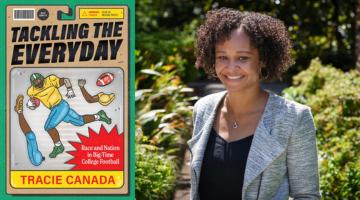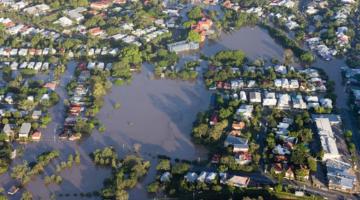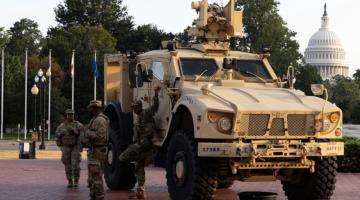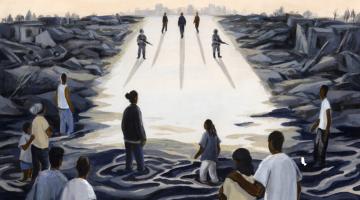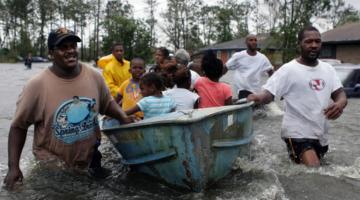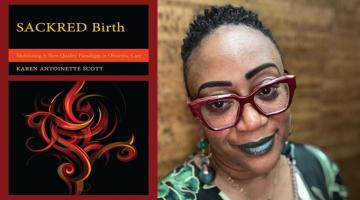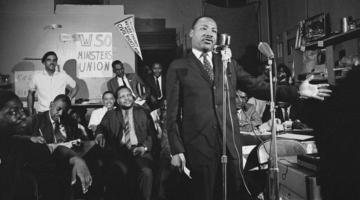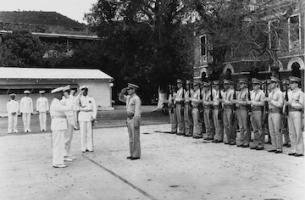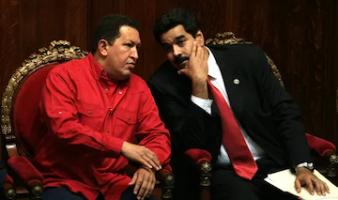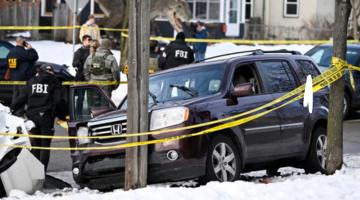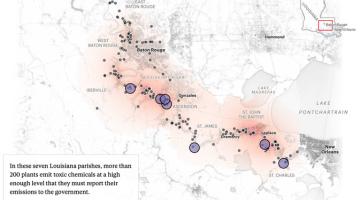“It’s not like New Orleans was caught off guard. This could have been prevented.”
What happened to the people of New Orleans after the levees broke on August 29, 2005 was not inevitable. While Hurricane Katrina was a horrible storm and brought destruction throughout the Gulf Coast, the destruction and suffering that came to New Orleans was the result of neglect of a primarily Black and poor population by both local and federal governments. New Orleans is a city that is entirely below sea level and the storm caused it to flood. The city flooded because the levees that were supposed to protect the city failed. The levees failed because they were inadequately designed and built by the United States Army Corps of Engineers. After that, the local and federal governments were slow to provide aid to the survivors. In the days after the storm, the richest country on the planet left this population to die – on top floors of residences, on rooftops, in the streets, on highways, in convalescent homes, and in prisons. We are told that a total of 1,833 people on the Gulf Coast died as a result of the storm and its aftermath. Surely an undercount.
But beyond the levees breaking was the absolute contempt that the US regimes and local white racists had for poor Black people. It was as if the storm was only a pretext for the attempted annihilation of the population. In the weeks after the levees broke, the Federal Emergency Management Agency (FEMA) took charge, but kept hundreds of rescue buses and helicopters at nearby bases idle, hired the private mercenary group Blackwater to protect the property of the ruling elite, kept reporters at bay, and locked down thousands of mostly Black people in the Superdome. Meanwhile, white police in nearby towns and armed white vigilantes patrolled streets and shot and killed Black people at will.
FEMA also refused to allow civilian volunteers to help their neighbors. Soldiers under FEMA’s authority barred a group of 500 civilian fishing boats from conducting rescues and turned away other volunteers. The National Guard set up check points throughout the city and only allowed white groups into parts of the city.
Malik Rahim, who lived in the Algiers neighborhood, the only part of New Orleans that was not flooded, described what was happening in the first days after the flooding began over the phone to San Francisco Bay View editor Mary Ratcliff. Ratcliff typed the conversation with Rahim verbatim and emailed it to activists all over the country. The conversation became the essay titled, “This is Criminal,” and was published in the Bay View on September 1, 2005, 3 days after the levees broke. A Vietnam veteran, member of the Black Panther Party, and a decades-long community organizer, Rahim described not only how the Black poor in New Orleans had long been abandoned before Katrina, but also how the government both prevented neighbors from helping each other and enabled white racial terror against the victims.
We reprint Rahim’s words below. And we honor the victims of Hurricane Katrina – victims of this violent, racist U.S. regime.
This is Criminal
Malik Rahim
It’s criminal. From what you’re hearing, the people trapped in New Orleans are nothing but looters. We’re told we should be more “neighborly.” But nobody talked about being neighborly until after the people who could afford to leave… left.
If you ain’t got no money in America, you’re on your own. People were told to go to the Superdome, but they have no food, no water there. And before they could get in, people had to stand in line for 4-5 hours in the rain because everybody was being searched one by one at the entrance.
I can understand the chaos that happened after the tsunami, because they had no warning, but here there was plenty of warning. In the three days before the hurricane hit, we knew it was coming and everyone could have been evacuated.
We have Amtrak here that could have carried everybody out of town. There were enough school buses that could have evacuated 20,000 people easily, but they just let them be flooded. My son watched 40 buses go underwater—they just wouldn’t move them, afraid they’d be stolen.
People who could afford to leave were so afraid someone would steal what they own that they just let it all be flooded. They could have let a family without a vehicle borrow their extra car, but instead they left it behind to be destroyed.
There are gangs of white vigilantes near here riding around in pickup trucks, all of them armed, and any young black they see who they figure doesn’t belong in their community, they shoot him. I tell them, “Stop! You’re going to start a riot.”
When you see all the poor people with no place to go, feeling alone and hopeless and angry, I say this is a consequence of HOPE VI. New Orleans took all the HUD money it could get to tear down public housing, and families and neighbors who’d relied on each other for generations were uprooted and torn apart.
Most of the people who are going through this now had already lost touch with the only community they’d ever known. Their community was torn down and they were scattered. They’d already lost their real homes, the only place where they knew everybody, and now the places they’ve been staying are destroyed.
But nobody cares. They’re just lawless looters—dangerous.
The hurricane hit at the end of the month, the time when poor people are most vulnerable. Food stamps don’t buy enough but for about three weeks of the month, and by the end of the month everyone runs out. Now they have no way to get their food stamps or any money, so they just have to take what they can to survive.
Many people are getting sick and very weak. From the toxic water that people are walking through, little scratches and sores are turning into major wounds.
People whose homes and families were not destroyed went into the city right away with boats to bring the survivors out, but law enforcement told them they weren’t needed. They are willing and able to rescue thousands, but they’re not allowed to.
Every day countless volunteers are trying to help, but they’re turned back. Almost all the rescue that’s been done has been done by volunteers anyway.
My son and his family —his wife and kids, ages one, five, and eight—were flooded out of their home when the levee broke. They had to swim out until they found an abandoned building with two rooms above water level.
There were 21 people in those two rooms for a day and a half. A guy in a boat who just said “I'm going to help regardless” rescued them and took them to Highway 10 and dropped them there.
They sat on the freeway for about three hours, because someone said they’d be rescued and taken to the Superdome. Finally they just started walking, had to walk six and a half miles.
When they got to the Superdome, my son wasn't allowed in— I don’t know why— so his wife and kids wouldn’t go in. They kept walking, and they happened to run across a guy they knew with a tow truck, and he gave them his own personal truck.
When they got here, they had no gas, so I had to push a hole in my gas tank to give them some gas, and now I’m trapped. I’m getting around by bicycle.
People from Plaquemines Parish were rescued on a ferry and dropped off on a dock near here. All day they were sitting on the dock near here. All day they were sitting on the dock in the hot sun with no food, no water. Many were in a daze; they’ve lost everything.
They were all sitting there surrounded by armed guards. We asked the guards could we bring them water and food. My mother and all the other church ladies were cooking for them, and we have plenty of good water.
But the guards said, “No. If you don’t have enough water and food for everybody, you can’t give anything.” Finally the people were hauled off on school buses from other parishes.
You know Robert King Wilkerson (the only one of the “Angola 3” political prisoners who’s been released). He’s been back in New Orleans working hard, organizing, helping people. Now nobody knows where he is. His house was destroyed. Knowing him, I think he’s out trying to save lives, but I’m worried.
The people who could help are being shipped out. People who want to stay, who have the skills to save lives and rebuild are being forced to go to Houston.
It’s not like New Orleans was caught off guard. This could have been prevented.
There’s military right here in New Orleans, but for three days they weren’t even mobilized. You’d think this was a third world country.
I’m in the Algiers neighborhood of New Orleans, the only part that isn’t flooded. The water is good. Our parks and schools could easily hold 40,000 people, and they’re not using any of it.
This is criminal. These people are dying for no other reason than the lack of organization.
Everything is needed, but we’re still too disorganized. I’m asking people to go ahead and gather donations and relief supplies but to hold on to them for a few days until we have a way to put them to good use.
I’m challenging my party, the Green Party, to come down here and help us just as soon as things are a little more organized. The Republicans and Democrats didn’t do anything to prevent this or plant for it and don’t seem to care if everyone dies.
Malik’s phone is working. He welcomes calls from old friends and anyone with questions or ideas for saving lives.
Malik Rahim, “This is Criminal,” San Francisco Bay View, November 23, 2008, reprinted in What Lies Beneath”: Katrina, Race, and the State of the Nation, edited by the South End Press Collective (Cambridge: South End Press, 2007), 65-68


